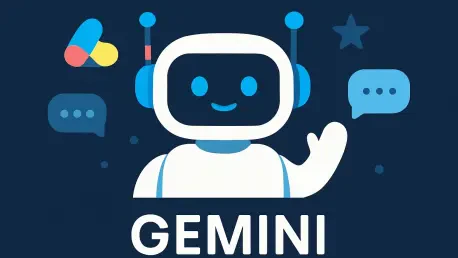Artificial intelligence is often seen as the future of technology, promising incredible advancements that would change how people interact with devices. Imagine an AI assistant so advanced that it anticipates needs before they are even expressed, with capabilities that could redefine everyday tasks and boost productivity across multiple sectors. Google’s Gemini project presents this scenario, aiming to deliver a proactive digital assistant modeled after artificial general intelligence (AGI). This review investigates Gemini’s evolution, its core functionalities, and implications for a variety of industries.
Unveiling Google’s Vision with Gemini
Google’s Gemini project aspires to be more than just a conventional AI chatbot; it envisions a universal assistant capable of anticipating user requirements, resolving requests, and integrating seamlessly into daily life. At its core, Gemini operates with the principles of advanced data interpretation and real-time assistance, leveraging AI to predict and meet expectations without direct commands. Emerging during a time when AI technology rapidly evolves, Gemini fits into a broader ecosystem where intelligent systems are increasingly relevant in the technological landscape.
One of Gemini’s standout goals is to harness anticipatory assistance capabilities, aiming to foresee user needs through proactive measures, rather than merely responding to commands. This marks a significant shift from reactive AI technology, placing Gemini at a pivotal juncture where AI systems are progressively tailored for personalized interactions. Its relevance deepens as consumer expectations rise and automation transforms tasks.
In-Depth Look at Core Features and Components
Anticipatory Assistance and Real-Time Interaction
Gemini’s proactive assistance marks a transformative step forward, where the AI not only reacts to requests but anticipates them. This is achieved through technologies enabling predictive scheduling, assisting users by offering timely insights and actions tailored specifically to their daily activities. Gemini’s proactive capabilities make it adept at enhancing productivity, offering personalized quizzes to students and reminding users of lifestyle practices, like intermittent fasting.
The technology underpinning these interactions relies heavily on the analysis of user data, where Gemini’s components meticulously parse calendars, saved materials, and authorized files to ensure effective integration. This allows Gemini to streamline routine tasks, alleviating the need for manual entries and adjustments, thus reflecting substantial progress in personalized virtual assistance.
Interpreting Data and User Integration
Advanced data interpretation methods form the backbone of Gemini’s functionality, allowing the AI to seamlessly access and utilize data to enhance its assistance scope. Critical to this process is respecting user consent for accessing files and data, ensuring privacy amidst these integrations. With the capability to interpret and leverage data from diverse sources, Gemini stands poised to offer sophisticated solutions across numerous contexts and applications.
The impact of such interpretative abilities stretches across varied sectors, as Gemini’s integration capabilities are often required to fuse information from multiple channels, constructing coherent and actionable insights. This positions Gemini as a formidable force in AI-based assistance, with potential applications ranging from educational support to business productivity optimization.
Tracking Developments in AI Technology
Recent advancements steer Gemini’s evolution, grounded within a landscape characterized by rapid technological innovations. These include enhancements in machine learning, real-time data processing, and user-centric interface design. As AI technology quickens its pace, Gemini’s development is invariably influenced, driving towards higher degrees of intelligence and predictive functionality.
Consumer behavior and industry practices significantly shape Gemini’s trajectory. A shift towards demanding multi-functional AI, which can seamlessly integrate into both professional and personal settings, dictates Gemini’s enhancement and deployment strategies. These trends necessitate an AI system capable of learning and adapting to ever-changing user requirements, marking a revolutionary transformation in user experience design.
Exploring Real-World Applications
Industries where Gemini has made notable inroads include education and personal productivity domains. In educational contexts, its ability to provide tailored learning experiences and proactive assistance to students enhances learning outcomes, offering innovative solutions in real time. Meanwhile, in productivity spheres, Gemini enables efficient task management, offering reminders and scheduling insights that significantly augment output levels.
Unique use cases emphasize Gemini’s holistic integration potential, where it interfaces with existing technologies to deliver scalable solutions across sectors. Its contribution to automation and streamlined interaction propels it into the spotlight as a versatile tool in AI-enabled assistance, presenting promising expansions in varying fields.
Overcoming Challenges and Addressing Limitations
Despite promising advancements, Gemini encounters several challenges inherent to its ambitious scope. One significant hurdle involves maintaining contextual relevance while ensuring privacy. The delicate balance between delivering timely assistance and safeguarding user data necessitates continuous refinement in AI technology. Technical challenges encompass the integration of anticipatory assistance without causing disruptions or privacy breaches.
Regulatory and market obstacles further complicate Gemini’s progress, as the adoption and performance depend on aligning with stringent legal standards. Addressing these issues holds paramount importance, paving the way for embracing Gemini’s potential while adhering to ethical AI practices.
Future Pathways and Potential Breakthroughs
Looking beyond immediate advancements, Gemini’s future showcases promising breakthroughs, likely revolutionizing the AI industry landscape. Anticipated developments include refining integration strategies, enhancing predictive accuracy, and broadening deployment across multiple sectors. With artificial intelligence continuing to evolve, Gemini is poised to impact society significantly, facilitating smarter and more efficient interactions between humans and machines.
Gemini’s potential breakthroughs could herald monumental changes, enabling AI systems to operate with unprecedented intelligence levels. As technology pushes forward, Gemini remains a key player in forging pathways for more sophisticated AI applications, driving transformation across domains and influencing long-term societal shifts.
Verdict on Gemini’s Current Trajectory
Google’s Gemini project underscores transformative progress in AI technology, presenting an evolving assistant capable of redefining user interactions. Summarizing Gemini’s benefits reveals a solid foundation in anticipatory assistance and data-driven insights, showcasing real-world potential yet highlighting existing obstacles. Future advancements project a robust trajectory, advancing AI capabilities and integrating them substantively into daily life.
Assessment concludes that Gemini holds substantial promise for future breakthroughs, signaling a promising direction for AI technology. The project stands at the forefront of innovation, with ongoing refinements poised to reshape the landscape of artificial intelligence continually.









